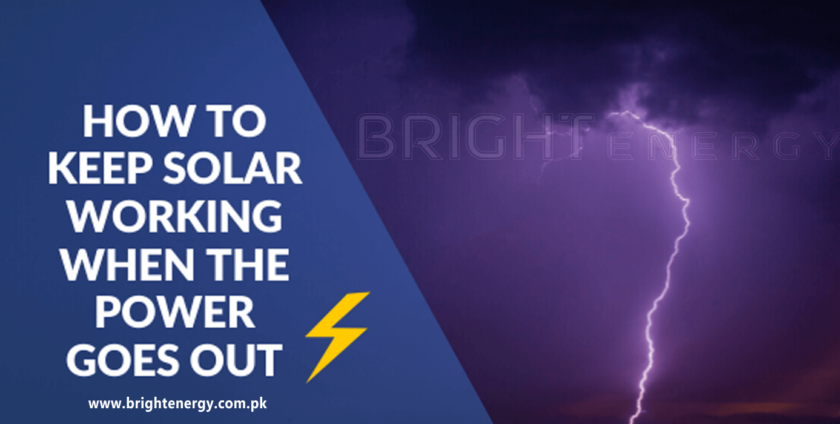
In recent years, grid-tied solar energy systems have gained popularity in Pakistan as a sustainable and cost-effective solution for generating electricity. These systems harness energy from the sun to power homes and businesses, reducing dependency on the traditional power grid. However, one common concern among Pakistanis is how to ensure uninterrupted power supply from their grid-tied solar systems during a power outage. In this article, we will explore effective methods and strategies to keep a grid-tied solar energy system operational even when the power goes out. We will discuss backup options, battery storage solutions, and essential considerations tailored to the needs and concerns of Pakistani homeowners. So, let’s delve into the topic and discover how you can keep your grid-tied solar energy system working seamlessly when facing power outages.
Understanding Grid-Tied Solar Energy
Systems
Grid-tied solar energy systems, also known as grid-connected or on-grid systems, have become increasingly popular in Pakistan. These systems work by harnessing sunlight through solar panels and converting it into usable electricity through an inverter. The electricity generated is then used to power homes and businesses, with any excess power being fed back into the grid. This integration with the grid allows for efficient energy consumption and reduced reliance on traditional power sources.
Backup Options for Grid-Tied Solar Systems
When facing power outages, it’s important to understand that a grid-tied solar system alone cannot provide electricity due to safety regulations. However, there are backup options available that allow you to utilize your solar energy system during these challenging times. One effective option is to install a battery storage system.
Battery Storage Solutions
To ensure an uninterrupted power supply from your grid-tied solar energy system during a power outage, integrating a battery storage system is highly recommended. These batteries store excess solar energy generated during the day and release it when needed, such as during an outage. By coupling a battery storage system with your grid-tied solar system, you can continue to power essential appliances and devices, maintaining a comfortable and productive environment even when the grid is down. Battery storage provides you with the ability to store and use the energy you generate, increasing the reliability and self-sufficiency of your solar setup.
Essential Considerations for Grid-Tied Solar Systems
While battery storage is an excellent option for backup power, there are specific considerations to keep in mind when integrating it with your grid-tied solar system in Pakistan. Firstly, ensure that your solar system is designed and installed correctly to support battery integration. Additionally, consider factors such as battery capacity, efficiency, and maintenance requirements. Regular system monitoring and troubleshooting are vital to ensure smooth operation and address any potential issues promptly.
Maintaining Your Solar Panels
Regular maintenance of your solar panels is crucial for optimal performance, especially during power outages. Keep them clean and free from dust, debris, and bird droppings to maximize sunlight absorption and electricity generation. Inspect the panels for any signs of damage or wear, such as cracks or loose connections, and address them promptly. By maintaining your solar panels, you can ensure their efficiency and longevity, enabling them to function effectively during power outages.
Proper System Installation and Maintenance
To maximize the performance and reliability of your grid-tied solar energy system, it is essential to have it installed and maintained by a professional and certified solar installer. They will ensure that the system is properly integrated with the grid, adhering to safety standards and regulations specific to Pakistan. Regular maintenance and inspections by professionals are necessary to identify and resolve any potential issues before they affect the system’s performance.
Safety Precautions
When dealing with grid-tied solar energy systems during power outages, it’s important to prioritize safety. As these systems continue to generate electricity even when the grid is down, there is a risk of electric shock if proper precautions are not followed. It is recommended to consult with a professional electrician or solar installer to understand the safety guidelines and take necessary measures to protect your family and utility workers.
Alternative Power Sources
While battery storage is a reliable backup option for grid-tied solar systems, considering alternative power sources is also worthwhile. Backup generators powered by fuels like gasoline, propane, or diesel can provide additional power during extended outages. It’s important to use generators safely, following proper ventilation practices to prevent the buildup of harmful gases such as carbon monoxide.
Monitoring and Troubleshooting
Monitoring your grid-tied solar energy system is essential for identifying any issues that may arise during a power outage. Many solar systems come with monitoring software that allows you to track the system’s performance and detect any abnormalities. If you notice any problems, such as a sudden drop in power output, it is crucial to troubleshoot and address the issue promptly. Contact your solar installer or a professional technician in Pakistan to diagnose and resolve the problem efficiently.
Preparing for Power Outages
To ensure your grid-tied solar energy system continues to function seamlessly during power outages, it’s important to have a well-thought-out plan in place. This includes understanding the capabilities and limitations of your system, knowing how to operate the backup options effectively, and keeping essential appliances connected to the backup power source. Staying informed about weather conditions and potential outages in your area allows you to take necessary precautions in advance.
Conclusion
In conclusion, Grid-tied Solar Energy Systems in Pakistan provide a sustainable and cost-effective solution for generating electricity. While they cannot directly supply power during outages due to safety regulations, integrating battery storage systems offers an effective backup option. Proper system installation, maintenance, and monitoring are essential for ensuring the reliability and longevity of your solar setup. Adhering to safety precautions and considering alternative power sources further contribute to a seamless and uninterrupted power supply. By following these guidelines and planning ahead, you can keep your grid-tied solar energy system working efficiently even when facing power outages.

Leave a Reply